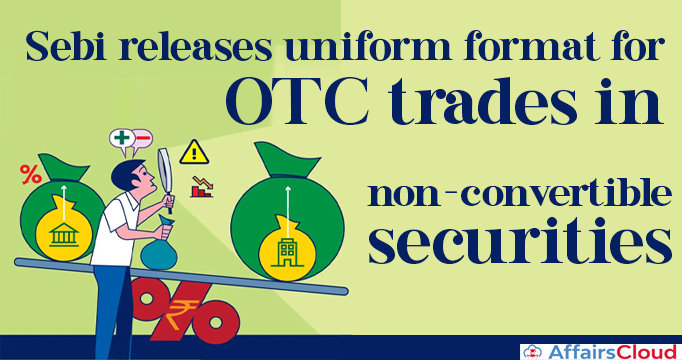 The Securities and Exchange Board of India (SEBI) has issued a uniform format for reporting Over-The-Counter (OTC) trades in listed Non-Convertible Securities (NCS).
The Securities and Exchange Board of India (SEBI) has issued a uniform format for reporting Over-The-Counter (OTC) trades in listed Non-Convertible Securities (NCS).
- The new regulations will enter into force on January 1, 2023.
Backdrop
i.According to SEBI, stock exchanges are given inaccurate and incomplete information from investors regarding OTC trading in listed NCS.
- As a result, incorrect and distorted information is displayed on the websites of the exchanges.
ii.In order to address the issue, SEBI has mandated that all OTC trades must be reported in a uniform format.
Over-The-Counter (OTC)
i.OTC trades are usually performed between two market entities without others being aware of the price at which the transaction was completed.
ii.The format mandates the disclosure of deal type (brokered or direct), ISIN, listed or unlisted securities, issuer name, coupon rate, issue description, traded price, traded yield, trade date and time, settlement date, settlement status, and reported trade conducted on the RFQ (Request for Quote) platform.
iii.SEBI has ordered stock exchanges to check compliance with the guidelines and report any discrepancies in investor reporting of OTC trades on a regular basis.
Click here for official circular in this regard.
SEBI Amends Buying, Selling of Mutual Funds Under Insider Trading Rules
SEBI has amended the Securities and Exchange Board of India (Prohibition of Insider Trading) Regulations, 2015, to include the buying and selling of mutual fund units within the scope of insider trading rules.
- The new regulations may be called the Securities and Exchange Board of India (Prohibition of Insider Trading) (Amendment) Regulations, 2022.
- The new norms became effective on November 24, 2022.
Backdrop
i.SEBI’s new ruling comes in the wake of the Franklin Templeton incident, in which the fund house’s few executives were accused of redeeming their holdings in the schemes before the six debt schemes’ redemption deadlines.
ii.Currently, insider trading rules apply to dealing in securities of publicly traded companies or those going to be listed when in possession of Unpublished Price Sensitive Information (UPSI).
- Mutual fund units are specifically excluded from the definition of securities under the rules.
Key Points:
i.Asset Management Companies (AMCs) will be required to disclose information about holdings in the units of its mutual fund schemes held by the AMC, trustees, and their immediate families on the platforms of stock exchanges on an aggregate basis.
ii.According to the provisions of the existing insider trading rules, SEBI has also developed a minimum code of conduct for designated persons.
iii.The compliance officer of the AMC would decide the closure period, during which a designated person may not transact in mutual fund units.
SEBI Allows Issuers of Municipal Debt Securities to Issue Green Bonds
SEBI announced that municipal debt securities issuers can now issue green bonds in accordance with the guidelines for issuing and listing non-convertible debentures.
- The action aims to promote the development and regulation of the securities market while protecting the interests of investors in securities.
This circular is effective immediately under the SEBI (Issue and Listing of Municipal Debt Securities) Regulations, 2015.
Key Points:
i.The term “green debt security” is not defined under the Listing of Municipal Debt Securities Regulations (ILMDS) rules.
- However, green debt securities are defined by SEBI’s (Issue and Listing of Non-Convertible Securities) or Non-Convertible Securities (NCS) guidelines.
ii.As a result, an issuer under the ILMDS Regulations may issue a green debt security if it satisfies the definition of “green debt security”, as per NCS Regulations.
- Such issuers must adhere to the green debt security provisions outlined in the NCS rules in addition to the criteria outlined in the ILMDS rules.
Green Bonds
Green bonds are similar to other types of bonds through which an issuer issues a debt instrument to raise funds from investors.
- The distinction between a green bond and regular bonds is that the proceeds of a green bond offering are “designated” for use in financing “green” projects.
Click here for official circular in this regard.
Recent Related News:
i.In October 2022, SEBI extended the Two-Factor Authentication (2FA) for subscription transactions in units of Mutual Funds (MFs) w.e.f. April 1, 2023.
ii.In this regard, the Association of Mutual Funds (AMF) formulated a schedule for implementation of 2FA and also a progress report on implementation of the authentication provisions on a bimonthly basis, starting from December 1, 2022.
About Securities and Exchange Board of India (SEBI):
Chairperson– Madhabi Puri Buch
Headquarters– Mumbai, Maharashtra
Establishment– 1992




